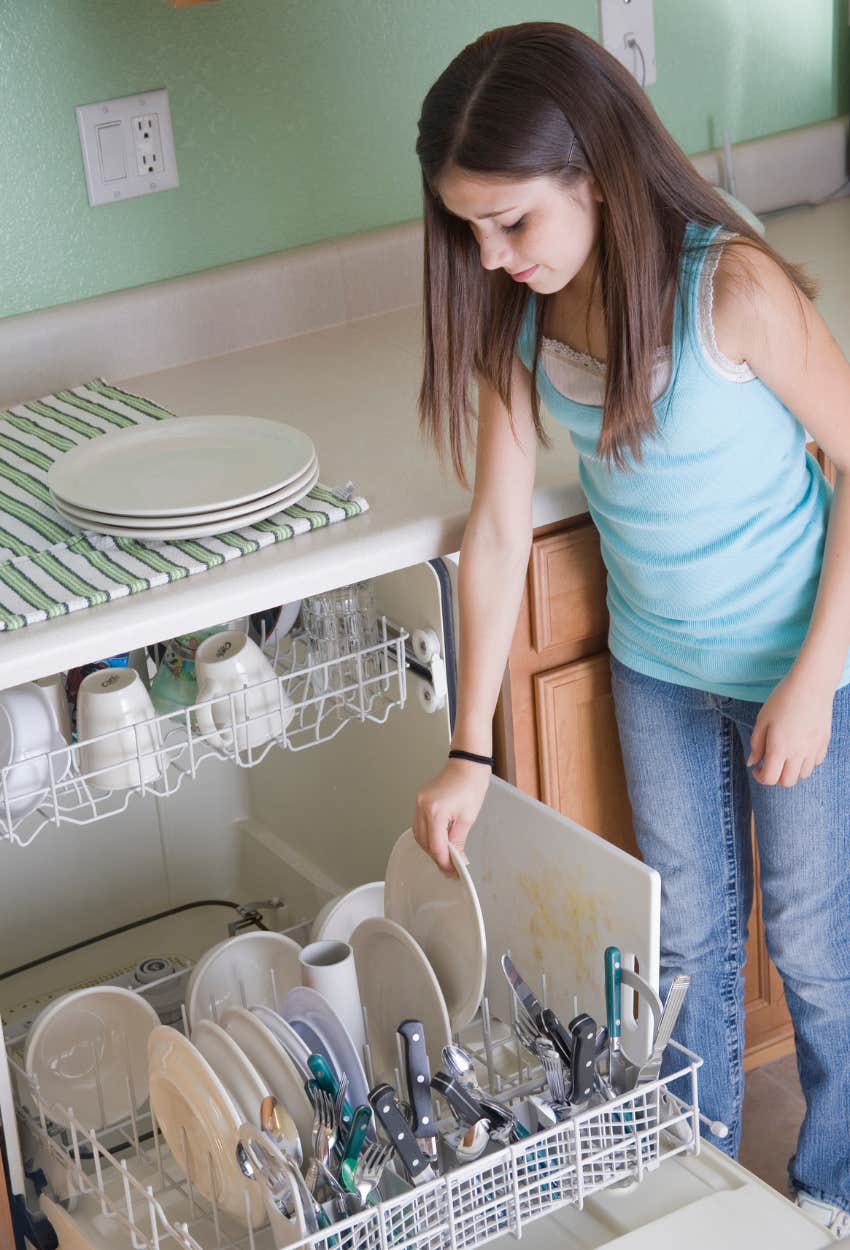Mom Refuses To Cook Dinner For Her Kids And Husband Who Leave The Kitchen A 'Filthy, Dirty' Mess
No cleaning, no cooking.
 New Africa | Shutterstock
New Africa | Shutterstock In a household, every member of the family should help around the house. That's the hope, at least. Unfortunately, for most women, that's certainly not the case.
One mom has decided to take a stand in her house after her pleas to her husband and teenagers to help keep the kitchen clean have fallen on deaf ears. Turning to Reddit, the mom shared the frustrating challenges she has faced within her family dynamic, especially when it comes to meal preparation and cleaning up. Despite the love she has for cooking, she is fed up with having a messy kitchen because of her husband and teenagers. After months of trying to figure out a balance, she has made the decision to stop cooking altogether if the kitchen is left in disarray.
A mom decided to stop cooking dinner for her family after her husband and kids neglected to help keep the kitchen clean.
If someone cooks a delicious meal for you, it is common courtesy to help clean up afterward. Unfortunately, most moms know otherwise. A 2024 survey out of USC found that moms are responsible for a whopping 64% of all physical household labor compared with their husbands’ 36%.
 DmitriiSimakov | Canva Pro
DmitriiSimakov | Canva Pro
Keeping that clear distinction in mind, the mom explained in her Reddit post that she had attempted to set up an arrangement with her family to ease some of the burdens: She handles the cooking, and her husband and children handle the cleaning. Seems like a simple and fair compromise, but things didn't turn out the way she hoped.
For the mother, a clean kitchen is a must. She wrote, "The problem is that they’re all extremely messy and aren’t at all bothered by a dirty, messy kitchen, whereas a dirty kitchen is the one thing that REALLY upsets me." After a long day at work, no one wants to come home to a messy kitchen, especially if you’re the one expected to cook.
The mom felt forced to stop cooking because asking them to clean wasn't working.
Despite her reminders and attempts to resolve the issue with her family, nothing changed. She wrote, "So after a long, hard day at work, I’d get back to a filthy, dirty kitchen and have to clean it before I could start cooking. I got tired of nagging and screaming — it just elevated my stress levels."
For her own well-being, she resorted to extremes in order to set clear boundaries with her messy family. "So I would get some food at work, arrive home, sit on the couch and read my book," she admitted. Adding, "After a while someone would ask what was for supper. I would say, 'I don’t know… I can’t really do much in a dirty kitchen.' And carry on reading my book. I would not end up cooking that evening as it got too late and everyone else would have to have cheese on toast — much to their disgust."
After many attempts to fix the situation, the mom found a different approach. Instead of letting the situation continue to stress her out, she subtracted herself from the equation. She set the boundary that if the kitchen isn't cleaned before she starts cooking, she's not cooking. Their inability to contribute was no longer being rewarded and it drove the message home.
While her tactic seemed extreme to some, the truth of the matter was they weren't going hungry because they ate cheese on toast for a couple of meals. And the best part? It actually worked. "Now when I get home the kitchen is spotless and the dishwasher on. Problem solved."
Was the mom's refusal to cook a fair consequence or an extreme means to an end?
The fallout from this change in behavior is mixed. On one side, the mother’s decision makes her family reevaluate their actions by facing the consequences. She will no longer tolerate a mess in her kitchen, hoping that this will make her family understand to clean up after themselves. However, the real question is, did they learn the lesson or just learn that if they want to eat, they need to do this one thing to keep mom happy?
 emyerson | Canva Pro
emyerson | Canva Pro
The mother, rightfully so, feels justified in her decision — she’s asked for help, she’s set reasonable expectations, and she’s reached a limit. However, it’s important to take note that not everyone in the household shares the same level of concern about the kitchen’s cleanliness. What might be intolerable for her — seeing a filthy kitchen — might be less of an issue for her husband and kids, who may not fully appreciate the emotional toll that a messy space takes on her. Ultimately, that should be the lesson.
The kids don't need to be happy about doing chores, but they should understand that it's part of being in a family. The lesson is that moms and wives are not the keepers of cleanliness. It's a job everyone contributes to.
Ultimately, the mother’s choice to refuse cooking because of a messy kitchen sheds light on the importance of setting boundaries for maintaining one’s mental and emotional health. The mother’s intentions were driven by a desire for respect, and it's clear that there must be another conversation about responsibilities in the household. Finding a compromise that works for everyone — where cleaning and cooking duties are evenly balanced — could be the next step in resolving this ongoing conflict.
